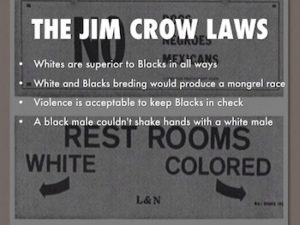
Jim Crow Laws are featured on this date. These state laws enforced racial segregation in the American South between the end of the formal American Reconstruction era (1877) and the beginning of the 20th-century American Civil Rights movement (the 1950s).
"Jim Crow," or "Jump Jim Crow," was the name of a minstrel practice performed in 1828 by its author, Thomas Dartmouth Rice, and by many imitators. The term came to be a derogatory epithet for Blacks and a designation of their segregated life. During the Reconstruction era, "carpetbaggers" from the North moved to the South and formed a coalition with freedmen (freed slaves) and whites who supported Reconstruction. Together, they politically controlled former Confederate states for varying periods.
From the late 1870s to the end of Reconstruction, Southern state legislatures, no longer controlled by “carpetbaggers” and Freedmen, passed laws requiring the separation of whites from "persons of color." These laws were called Jim Crow, which became a derogatory epithet for Blacks and a designation of their segregated life. Anyone of color, or probable or strongly suspected Black ancestry in any degree, was a "person of color."
The pre-American Civil War distinction favoring those whose ancestry was known to be mixed (particularly the Creole, half-French "free persons of color" in Louisiana) was abandoned. The segregation principle was extended to all municipalities, schools, parks, cemeteries, theaters, and restaurants to prevent any contact between Blacks and whites as equals. The laws were enforced by white intimidation (lynching being foremost among them) of Blacks. The laws were intended to keep Blacks in their place under conditions that were only a little less oppressive than under slavery.
In 1954, the Supreme Court declared segregation in public schools unconstitutional. Also, subsequent decisions ruled similarly on other kinds of Jim Crow legislation.
The Encyclopedia of African American Heritage
by Susan Altman
Copyright 1997, Facts on File, Inc. New York
ISBN 0-8160-3289-0